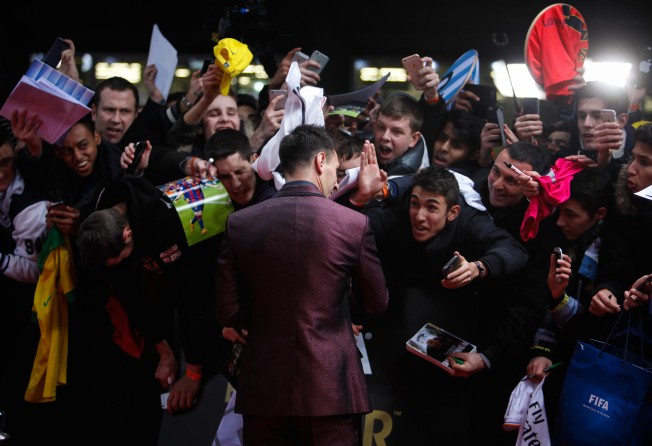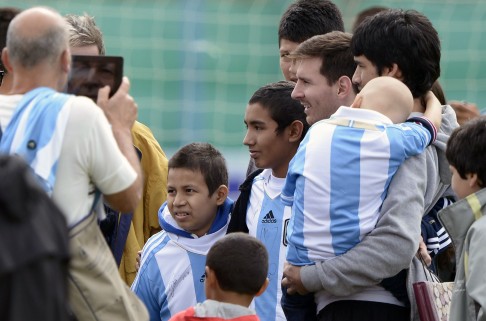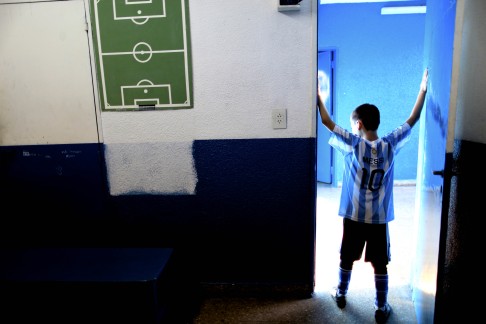Home and Away: What comes next when the Messi dream is dashed?
Many youngsters aspire to become great footballers like Argentine, but clubs fail to prepare them for missing the cut

The cream of world football gathered in Zurich for the Ballon d'Or award ceremony this week, and the long flight of fancy of seeing Lionel Messi in a Chelsea, Manchester United or Manchester City shirt flew into reality's airspace.
Messi - again beaten into second place as world footballer of the year by Real Madrid's Cristiano Ronaldo - sparked speculation he might be heading to the EPL by saying his future was uncertain.
"I always said that I would finish my career at Barcelona and then at [his home town club in Argentina] Newell's. But I don't know where I'll be next year. As Cristiano said recently, football has many twists and anything can happen," he said.
Whether he was showing his Machiavellian side and seeking to manipulate Camp Nou politics, or really does harbour a desire to experience the rough and tumble of the EPL, no one knows.
But his words have many - including millions of English schoolboys - licking their lips at the prospect of seeing their hero going on mazy dribbles in England.
He is king among all the current greats when it comes to inspiring millions of youngsters around the world to become footballers.
You can see why. Forget (if you can) the obscene wealth, and riches and beautiful wife. A desire to outskill your opponent, score award-winning goals and lap up the fans' adulation like Messi is what draws most youngsters.
In England alone, thousands of boys wearing Barcelona shirts or sleeping under Barcelona duvet covers, dream of becoming a professional footballer just like the diminutive Argentine.

They live out their fantasy on rain-lashed pitches every weekend, trying to impress proud parents and coaches - and who knows, the stranger watching intently and taking notes.
Most of them end up in adulthood like the rest of us, pursuing careers in less glamorous roles. But a lucky few are spotted and signed by a club.
And from those few, the odd one or two will break into the big time and be offered a short, hectic but financially rewarding career to set them up for life.
If you had a child with a natural football talent, wouldn't you do all in your power to give him every chance of a high-stakes, dream occupation - readily agreeing (if the call ever came) to sign him over to a club that values him enough to want to take him to the top of his game with expert coaching and guardianship?
Of course, you would - though a new study released this week might make you rethink.
According to XPRO, a British charity offering help, support and advice to former players of all ages, 96 per cent of schoolboys signed by clubs in England and Wales at 16 will not play again from the age of 18.
Of those who do earn professional contracts, only 2 per cent will still be professionals past 21.

Of greater worry is that more than half of young British footballers aged between 15 and 18, who were rejected by clubs after being signed as schoolboys, suffered problems such as depression, anxiety and loss of confidence - or turned to alcohol and substance use within a month of being released.
And you thought Xboxes and iPads were bad for children. Clinical psychologist Dr David Blakelock, from Teesside University, questioned some 100 youth players aged 15 to 18 at clubs at three points in their fledgling careers - before selection procedures, seven days after and 21 days after.
Of those players who were released, 54.5 per cent were experiencing psychological distress at 21 days compared with 35.7 per cent at seven days.
"The results suggest that in the first month, a sizeable proportion can experience a range of psychological problems - depression, anxiety, a loss of confidence and impairment in everyday functioning," warned Blakelock.
These findings - the first of their kind - show clubs clearly must manage expectations better and offer meaningful after-club support and advice.
Even beating the odds and becoming a professional player and completing a successful career does not shield you from suffering and pain, however.
Recent studies showed playing professional football renders you 1,000 more times likely to suffer osteoarthritis; one in four present and former professionals suffer symptoms of anxiety and depression; one in three are divorced within the first 12 months of retirement; and two in every five are bankrupt within five years of retiring.
Oh, and let's not forget the 141 former players now in prison, of which 124 are under 25, with five serving life sentences and one a double life term, and 127 in for drug-related offences.
As a fan and a parent, one would think this would never be said, but here's hoping the influential Messi stays in Spain.